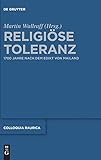Religiöse Toleranz : 1700 Jahre nach dem Edikt von Mailand / hrsg. von Martin Wallraff.
Material type: TextSeries: Colloquia Raurica ; 14Publisher: Berlin ; Boston : De Gruyter, [2016]Copyright date: ©2016Description: 1 online resource (VIII, 348 p.)Content type:
TextSeries: Colloquia Raurica ; 14Publisher: Berlin ; Boston : De Gruyter, [2016]Copyright date: ©2016Description: 1 online resource (VIII, 348 p.)Content type: - 9783110370874
- 9783110437225
- 9783110437423
- 201.7 23
- BR180
- online - DeGruyter
- Issued also in print.
| Item type | Current library | Call number | URL | Status | Notes | Barcode | |
|---|---|---|---|---|---|---|---|
 eBook
eBook
|
Biblioteca "Angelicum" Pont. Univ. S.Tommaso d'Aquino Nuvola online | online - DeGruyter (Browse shelf(Opens below)) | Online access | Not for loan (Accesso limitato) | Accesso per gli utenti autorizzati / Access for authorized users | (dgr)9783110437423 |
Browsing Biblioteca "Angelicum" Pont. Univ. S.Tommaso d'Aquino shelves, Shelving location: Nuvola online Close shelf browser (Hides shelf browser)
Frontmatter -- Vorwort -- Inhalt -- Teil I. Der moderne Toleranzbegriff -- Toleranz und Relativismus -- Von religiöser Toleranz zum Tolerantismus. Zur Universalisierung des Toleranzbegriffs in der Aufklärung -- Teil II. Spätantike und Toleranz -- Das „Mailänder Edikt“ -- Religiöse Toleranz als politisches Argument -- Constantine and the Donatists -- Textgemeinschaften und die Erfindung von Rivalität und Toleranz in der Kaiserzeit (2./3. Jh. n. Chr.) -- Toleranz braucht Rechtfertigung -- Religionsfreiheit und Individualisierung von Religion -- Teil III. Wirkungsgeschichte in der Neuzeit -- Konstantin und das Mailänder Edikt in der Historiographie der Reformationszeit -- Pietismus und Gewissensfreiheit -- „Allgemeine Toleranz“ -- Instrumentelle Toleranz und Jacob Burckhardts Constantin -- Das Edikt von Mailand in der politischen Kultur Italiens im 20. Jahrhundert -- Stellenregister
restricted access online access with authorization star
http://purl.org/coar/access_right/c_16ec
1,700 years ago, the Roman emperors Constantine and Licinius granted religious freedom – also and particularly for Christianity. The religious policy of Constantine is often associated with the modern ideal of tolerance. This book inquires into the correctness and limitations of this label through a close historical study of this concept and with particular attention to the forms of religious tolerance in Late Antiquity. One important feature of this study is its focus on the reception of Constantine's religious policy from the Reformation era until modern times.
Vor 1700 Jahren gewährten die römischen Kaiser Konstantin und Licinius Religionsfreiheit – auch und vor allem für das Christentum. Die Religionspolitik Konstantins wird oft mit dem modernen Ideal der Toleranz in Verbindung gebracht. Der vorliegende Band fragt nach Recht und Grenzen dieser Zuordnung. Dabei wird zum einen das Konzept der Toleranz selbst mit historischer Tiefenschärfe reflektiert. Zum zweiten werden (Vor-)Formen religiöser Toleranz in der Spätantike untersucht. Schließlich liegt ein Schwerpunkt in der neuzeitlichen Wirkungs- und Forschungsgeschichte zu Konstantin: die unterschiedlichen Formen der Rezeption seiner Religionspolitik von der Reformationszeit bis zur Moderne.
Issued also in print.
Mode of access: Internet via World Wide Web.
In German.
Description based on online resource; title from PDF title page (publisher's Web site, viewed 28. Feb 2023)









